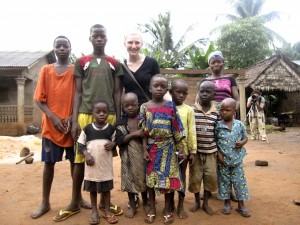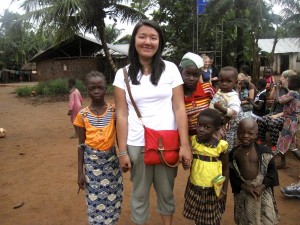Katie & Sam (again)
Today a group of 6 students put on a health fair for the local community that addressed some health concerns that the Beninoise people face on a daily basis. Some of the topics included: sprains, cuts, burns, diarrhea and how to make a first aid kit. The health fair took place right after mass in the day care room, which is a small open room with a roof made from dried palm leaves. As we asked the staff how many people we should expect to attend, the number varied anywhere from 20-400. Looking at the small room, it was hard to imagine 400 people crammed into such a small space. The health fair group made flyers that Torunn translated into French for people to have. As the fair went on, we roughly 100 people attend. A good number considering this is the first year the fair has taken place.
Sam and I were in change of sprains. We taught people the R.I.C.E (rest, ice, compress, elevate) acronym but it did not translate very well. We brought ACE wraps from Gonzaga, but also taught people how to make ones out of cut up t-shirts. As the health fair went on, we received a lot of questions not related to sprains. Such as, how to preform CPR, what to do if someone is unconscious, and how to take care of a nose bleed. We answered the questions to the best of our abilities, but we felt uncomfortable giving medical advice.
For me personally (Katie), teaching at the health fair made me very excited to pursue my dream of becoming a nurse. Being able to help the Benin community, in any way possible, gives me motivation to work hard through nursing school over the next two years.
As for me (Sam), I’m pleasently surprised what I learned in nursing school has been retained! I’m just kidding but like Katie, it motivates me to study harder in school. It’s a different type of environment than nursing clinicals in the U.S. but I am reminded that my role as a nurse is still the same.
Tomorrow we are putting on two different health fairs for the Songhai administers and interns. We will update you on what happens next! Pictures to come!

